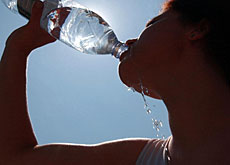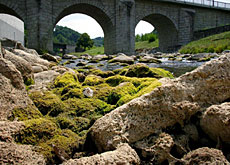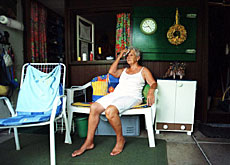Government learns from heatwave mistakes

The exceptionally hot summer of 2003 caused almost 1,000 deaths in Switzerland, say the authorities, who admit they at first underestimated the impact.
To ensure that there is no repeat, the government has issued guidelines on coping with extreme heat. The advice is aimed mainly at the elderly.
On Tuesday officials released a study showing that the number of deaths between June and August 2003 was seven per cent higher than normal.
Initially the authorities believed 300 people had died during the hottest summer in 500 years. Temperatures regularly exceeded 35 degrees Celsius during the day and did not fall below 20 degrees at night.
The study found that mortality was greater among elderly people and residents of Basel, Geneva and Lausanne where temperatures were highest.
“We were taken very much by surprise [by the heatwave],” said Thomas Zeltner, head of the Federal Health Office.
“Because the hot summer was so unexpected we were not prepared for it,” he told swissinfo.
Drink plenty
But Zeltner pointed out that Switzerland suffered far less than neighbouring France where the death rate was 54 per cent higher than normal. In Switzerland 975 deaths were attributed to the heatwave.
The Health Office has produced information sheets and posters advising the public on how best to cope with hot temperatures.
As well as outlining the symptoms of heatstroke and dehydration, it lists three important ways of surviving periods of excessive heat: resting rather than exercising; keeping the heat out by closing blinds and curtains during the day and opening windows at night; and lastly staying cool by drinking plenty of liquid and eating light meals.
Zeltner said that if these simple rules were observed many deaths could be avoided. The government has also asked the meteorological authorities to issue warnings when heatwaves are expected.
It said that owing to climate change, heatwaves could become a regular occurrence. High temperatures and strong sunlight also lead to raised ozone levels, which could trigger respiratory tract infections and limit the functioning of the lungs.
Summer 2003 was the hottest in Europe for 500 years, with temperatures above 30 degrees recorded on 27 days in Switzerland.
“In future we will have many more summers like this, perhaps even worse,” warned Philippe Roch, head of the Swiss environment agency.
swissinfo with agencies
2003 was the hottest summer in Europe for 500 years.
Temperatures of over 35 degrees were no exception.
In Switzerland there was a 7% increase in the number of deaths, with 975 deaths blamed on the weather.
Old people were particularly affected, as well as residents of Basel, Geneva and Lausanne.
Deaths in Basel were up 24%.

In compliance with the JTI standards
More: SWI swissinfo.ch certified by the Journalism Trust Initiative


You can find an overview of ongoing debates with our journalists here . Please join us!
If you want to start a conversation about a topic raised in this article or want to report factual errors, email us at english@swissinfo.ch.